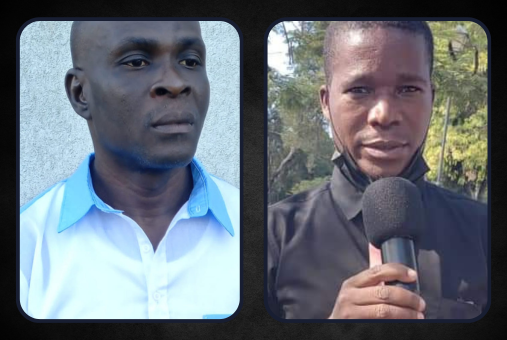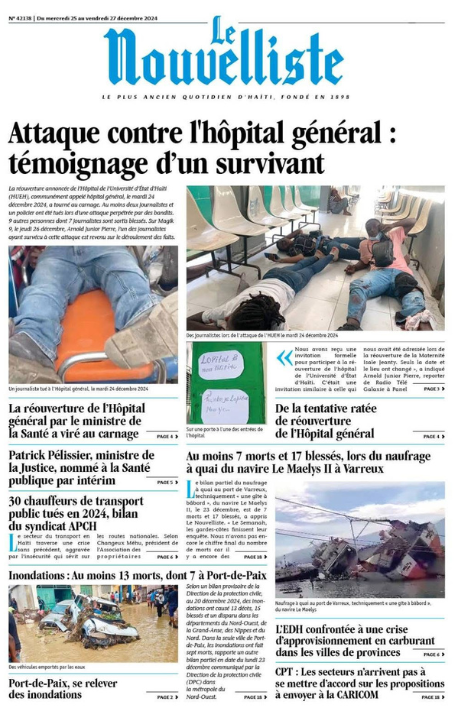Press groups in Haiti accuse local authorities of failing to implement necessary safety measures in late December at an event at a major hospital in Port-au-Prince, where a gang shootout left three dead, including two journalists, and dozens more injured.
The Collective of Online Media (CMEL for its initials in French) held the Ministry of Health responsible for the events and condemned authorities’ "unacceptable negligence" in an area that is widely known to be controlled by gangs. Authorities were attempting to reopen University Hospital of Haiti —the largest in the country and informally known as General Hospital—after it was closed in a gang attack in February last year.
Just a week before the recent shooting, another medical facility, the Bernard Mevs Neurological Trauma Center, had been firebombed, apparently by Viv Ansanm, the same gang that claimed responsibility for the attack on General Hospital.

Jimmy Jean (left) worked for an online TV channel, while Marckendy Natoux (right) collaborated with several media and had his own digital media. Both were killed in the Dec. 24 attack. (Photo: Facebook of Natoux Le Vrai Marckendy)
“This unspeakable act [...] constitutes a flagrant and intolerable attack on press freedom, a fundamental pillar of our democracy,” the online media collective said in a statement. “Although the media were officially invited to cover the event, no security measures were implemented to protect journalists, despite the well-known threat posed by gangs in this region.”
Marckendy Natoux and Jimmy Jean were the journalists who lost their lives in the attack. Seven other journalists were injured, four of them seriously: Réginald Balthazar suffered a chest wound, Jocelyn Justin had his lower jaw detached, Florise Desronvil sustained a wound to the left buttock, and Vélondy Miracle was wounded in the neck, according to the online media collective.
The journalists with less severe injuries were identified as Robens Pétion, Jean-Jack Aspèges, and Rosemond Vernet.
Arnold Junior Pierre, another reporter present at the shooting, told the Magik9 radio network he did not see any security personnel, except for one Haitian National Police vehicle patrolling the area.
Although nearly a hundred people had gathered at the hospital, including staff, reporters, and citizens, nothing seemed ready for a reopening, Pierre told Magik9.
Health ministry officials had called on the press to attend the event at 8 a.m., according to Reuters. The media waited for almost three hours for the arrival of officials scheduled to lead the event, including health minister Duckenson Lorthé Blema, who never arrived, Reuters reported.
At about 11 a.m., the police vehicle patrolling the area appeared to send a message, but those present seemed not to understand it, Pierre recounted. About 20 minutes later, gunshots were heard.
“I counted 49 seconds of uninterrupted shooting from gang members,” Pierre said. He added that the wounded had to wait two hours after the gunfire before evacuation operations began. Those who came to the rescue, he said, were agents from the National Palace General Security Unit.
Jacky Marc, international delegate of the Association of Haitian Journalists (AJH for its initials in French), said there is information suggesting the attack occurred because gangs opposed the hospital's reopening.
“The Health minister decided to reopen the hospital, even when they [the gangs] were opposed to it,” Marc told LatAm Journalism Review (LJR). “Journalists were there to cover the activity. It was the responsibility of the National Police and of the Military to decide to secure the place.”
Marckendy Natoux and Jimmy Jean attended the reopening of General Hospital without knowing it would be their last assignment.
Natoux worked as a freelance journalist for several media outlets and ran his own digital platform, Marc Info5. He also collaborated in the marketing office of the U.S. Agency for Global Media (USAGM).

The press was called at 8 am for the reopening of the hospital. The reporters had been waiting for almost three hours for the event to begin when the attack started. (Photo: The Nouvelliste Facebook)
Jean worked as a reporter for the digital channel Moun Afè Bon TV, according to the Committee to Protect Journalists (CPJ).
Approximately three hours before his death, shortly after 8 a.m., Natoux broadcast a final Facebook Live about the cleaning work on a street near the hospital.
Jacques Desrosier, secretary general of AJH, told LJR that the injured journalists were gradually recovering. Jocelyn Justin, the journalist whose jaw was severely injured in the attack, successfully underwent surgery, according to the digital outlet Antoine INFO TV. Justin will need another surgical procedure in the coming days, Desrosier added.
The deaths of Natoux and Jean sparked outrage among the media, press freedom organizations, and civil society groups, which demanded concrete actions from Haitian authorities to ensure justice.
The CMEL asked the Haitian state to fully assume responsibility for the murdered journalists and demanded full payment of medical expenses for the injured, a dignified funeral for Natoux and Jean, and compensation for their families.
The CPJ, in a statement, urged Haitian authorities to bring the journalists’ killers to justice. The Inter-American Commission on Human Rights Special Rapporteur for Freedom of Expression condemned the murders and called on authorities to investigate the crimes diligently.
The UN’s top human rights expert, William O’Neill, said the attacks in late December highlighted the dangers faced by the press in Haiti, where at least 10 journalists have been killed since 2021, according to CPJ.
Two days after the attack, a delegation led by Haiti’s Prime Minister’s Chief of Staff visited the injured journalists at La Paix University Hospital to express the government’s support and assess their needs, according to a statement.
Prime Minister Alix Didier Fils-Aimé pledged the government would cover the medical expenses of the injured and the funeral costs of the deceased, as well as psychological support for the victims’ families.
A day later, on December 27, Duckenson Lorthé Blema was removed from his position as Minister of Health. His dismissal was announced in a decree signed by Prime Minister Fils-Aimé, which acknowledged that Blema failed to implement the necessary security measures for the General Hospital’s reopening.
Fils-Aimé expressed his determination to intensify the fight against gangs to eradicate insecurity in the country. He said all state forces and the National Police are mobilizing to restore order.
Jacques Desrosier, AJH’s secretary general, confirmed the Haitian government is covering expenses for the injured journalists. However, he said the funerals for Natoux and Jean still had not been arranged.
“I can tell you that, for now, the funerals are on hold,” Desrosier told LJR. “The state has been unable to reach an agreement with the families of the victims.”
The journalists’ bodies remain in a private morgue since the day of the attack, Haïti Infos Pro reported.
A special commission was created to investigate the tragedy and serve as a liaison between the victims and the government. The initiative was led by Justice and Public Security Minister Patrick Pelissier, who was named interim Minister of Health, according to SOS Journalistes, a Haitian media association that is part of the commission.
“The funeral will take place on Saturday, January 11, 2025. Preparations are underway with the affected families,” said Guyler C. Delva, SOS Journalistes’ secretary general, in the statement obtained by LJR. “The planned compensations will be disbursed after verification and in accordance with the commission’s report.”
As for the judicial investigation initiated by Haiti’s Central Directorate of Judicial Police, little progress has been made. Former Health Minister Blema refused a subpoena to appear before authorities on Friday, January 3, and his lawyer also failed to appear, Haïti Infos Pro reported.